人教精通版小学英语下册六年级三单元知识点
人教版六下英语第三单元知识要点

小学英语PEP六年级(下册)知识点汇总Unit 3 Where did you go?【重点词汇】go fishing--- went fishing 去钓鱼go camping --- went camping 去野营go swimming--- went swimming 去游泳ride a bike--- rode a bike 骑自行车ride a horse--- rode a horse 骑马hurt my foot--- hurt my foot 我的脚受伤take pictures--- took pictures 照相buy gifts--- bought gifts 买礼物eat fresh food--- ate fresh food 吃新鲜的食物fall off---fell off 从…摔倒licked (lick的过去式)舔could (can的过去式)能及其过去式laughed(laugh的过去式)笑【重点语法】▶一般疑问句,把did提前—Did you help your parents clean the room ? ( 当句子变为一般疑问句,动词应还原)—Yes , I did ./No, I didn’t .▶特殊疑问句: 疑问词+did+主语+V原形+其它?(这几组句子常会在问答选择里出现)1. —Where did you go on your holiday? 假期你去了哪里?—I went to Xinjiang. 我去了新疆.2. —What did you do on your holiday?你假期干了什么?—I sang and danced. 我即唱了歌又跳了舞.3. —How did you go there? 你怎样去的?—I went by train. 我坐火车去的.4.—When did you go? 你什么时候去的? —I went last Monday. 我上周一去的.【重点句型】这些句子要去熟读,掌握好中文意思,出现问答的时候要会选择问句或答语1. --- What happened ? --I fell off my bike and hurt my foot. 怎么了?我从自行车上摔下来了,并且弄伤了我的脚。
六年级英语下册第三单元知识点整理人教版

六年级英语下册第三单元知识点整理人教版Please find below the corrected and rewritten n of the article:e to download the summary of Unit 3 of Grade 6 ___。
which is essential for learning.Unit 3I。
Vocabulary (in past ___)buy gifts - bought giftsfish - fishedride - rodehurt - hurteat - ate___ - tookbuy - boughtgo camping - went campinggo fishing - went fishingtake pictures - took picturesgo - wentII。
Phrasesride a horse - rode a horseride a bike - rode a bikehurt my foot - hurt my footeat fresh food - ate fresh foodfar from - away fromlook like - resemble___1.What happened?2.Are you okay?3.I'm fine now.4.Where did you go yesterday。
- I went to a park.5.It looks like a mule.6.Did you go to Turpan。
Yes。
we did.7.How did you get there?8.We went there by ___.9.Sounds great.IV。
Grammar___:1.Irregular verbs have unique past ___ forms.2.Add -d to verbs ending in -e。
人教人教六年级下册 Unit 3 知识清单
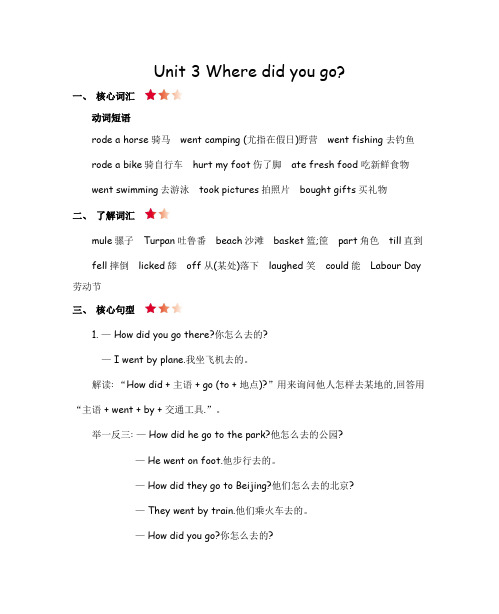
Unit 3 Where did you go?一、核心词汇 动词短语rode a horse 骑马 went camping (尤指在假日)野营 went fishing 去钓鱼rode a bike骑自行车 hurt my foot伤了脚 ate fresh food 吃新鲜食物went swimming去游泳 took pictures拍照片 bought gifts买礼物二、了解词汇 mule骡子 Turpan吐鲁番 beach沙滩 basket篮;筐 part角色 till直到fell摔倒 licked舔 off从(某处)落下 laughed 笑 could能 Labour Day 劳动节三、核心句型 1. — How did you go there?你怎么去的?— I went by plane.我坐飞机去的。
解读: “How did + 主语 + go (to + 地点)?”用来询问他人怎样去某地的,回答用“主语 + went + by + 交通工具.”。
举一反三: — How did he go to the park?他怎么去的公园?— He went on foot.他步行去的。
— How did they go to Beijing?他们怎么去的北京?— They went by train.他们乘火车去的。
— How did you go?你怎么去的?— I went by bus.我乘公共汽车去的。
注意: what, when, who, how是小学阶段的主要疑问词,它们分别指“什么”“何时”“谁”“怎样”,要注意问答的匹配。
— What did you buy in the bookstore?你在书店买了什么?— I bought a dictionary.我买了一本词典。
— When did you go to the bookstore?你什么时候去的书店?— At 7:00 p.m. yesterday.昨天晚上七点。
六年级下册英语Unit3知识点

六年级下册英语Unit3知识点学习六年级英语,最重要是先把课本上的知识点全部掌握,下面店铺为大家带来六年级下册英语Unit3知识点,欢迎大家学习!六年级下册英语Unit3知识点:A部分1询问过去发生了什么事的句型询问过去发生了什么事的句型——What happened?课文应用:What happened? 怎么了?句型结构:What happened?重点解析:此句型意为“怎么了?”。
句中的what是疑问词,意为“什么”。
因为要询问的是过去发生的事,所以要用happen的过去式happened,意为“发生了”。
如果要具体询问某人怎么了,可以在happened后面加上“to+某人”,意为“……怎么了?”。
2如何询问对方目前的身体状况课文应用:Are you all right?你还好吧?I'm OK now.我现在没事了。
句型结构:问句:Are you all right?答语:I'm OK now./Not very well.重点解析:此问句用于询问对方目前的身体状况。
“all right”意为“好吧”,在此处表示身体状况。
答语分为肯定回答和否定回答两种。
肯定回答可以为“I'm OK now.”,否定回答可以为“Not very well.”。
3如何询问对方过去去了哪儿课文应用:Where did you go?你去哪儿了?Mt.Tianshan,Xinjiang.新疆的天山。
句型结构:问句:Where did you go(+过去时间)?答语:(I/We went to+)地点.重点解析:这个问句用于询问对方过去去了哪儿,是由where引导的特殊疑问句。
did:因为是一般过去时,所以用did帮助构成疑问句。
go:由于前面已经使用了表示过去时的did,所以句中动词要用原形。
4如何表达“某物看起来像……”如何表达“某物看起来像……”——It looks like.课文应用:It looks like amule!它看起来像头骡子!句型结构:It looks like+其他.重点解析:look like是动词短语,意思是“看起来像”。
人教英语精通版六年级下册_Unit3_知识清单

Unit We are going to travel.一、核心词汇1. 动词travel 旅行know知道hear听见visit参观want想see看见2. 其他lake湖;湖泊place位置;地点them他们;她们;它们(they的宾格) tomorrow明天favourite最喜欢的3. 短语by plane乘飞机the Great Wall长城二、了解词汇1. 名词America美国Australia澳大利亚Britain英国Canada加拿大Shanghai 上海Xi’an西安Dalian大连Disneyland 迪士尼乐园2. 短语the Ming Tombs明十三陵the Temple of Heaven天坛the Forbidden City紫禁城Beihai Park北海公园Tower Bridge伦敦塔桥Big Ben大本钟Niagara Falls 尼亚加拉瀑布CN Tower加拿大国家电视塔Sydney Opera House悉尼歌剧院by train乘火车by ship乘轮船三、核心句型1. We are going to visit Beijing, Harbin and Xi’an. 我们将要参观北京、哈尔滨和西安。
解读:这是一般将来时的肯定句形式,句型结构为主语+ be going to + 动词原形+ 其他.举一反三: She is going to listen to music tomorrow. 明天她要听音乐。
2. —When are we going to visit the Summer Palace? 我们什么时候去参观颐和园?—Tomorrow morning. 明天上午。
解读:这是一般将来时态的特殊疑问句。
句型结构为特殊疑问词+ be动词+ 主语+ going to + 动词原形+ 其他?举一反三: —What are you going to do? 你要做什么?—I am going to watch TV. 我要看电视。
人教精通版六年级英语下册各单元知识点汇总
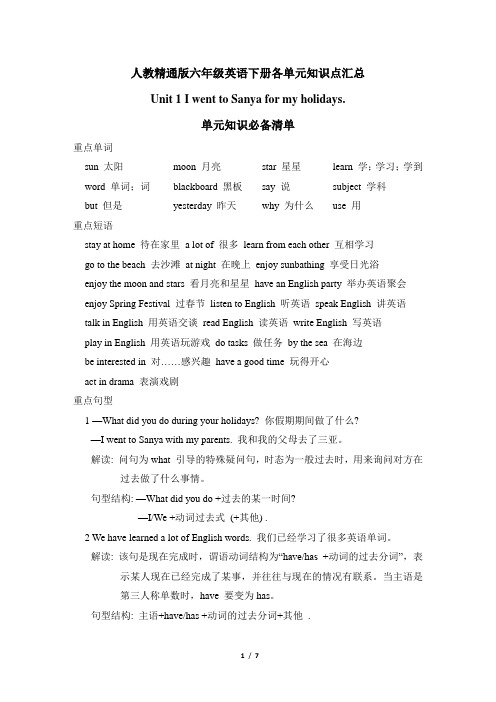
人教精通版六年级英语下册各单元知识点汇总Unit 1 I went to Sanya for my holidays.单元知识必备清单重点单词sun 太阳moon 月亮star 星星learn 学;学习;学到word 单词;词blackboard 黑板say 说subject 学科but 但是yesterday 昨天why 为什么use 用重点短语stay at home 待在家里a lot of 很多learn from each other 互相学习go to the beach 去沙滩at night 在晚上enjoy sunbathing 享受日光浴enjoy the moon and stars 看月亮和星星have an English party 举办英语聚会enjoy Spring Festival 过春节listen to English 听英语speak English 讲英语talk in English 用英语交谈read English 读英语write English 写英语play in English 用英语玩游戏do tasks 做任务by the sea 在海边be interested in 对……感兴趣have a good time 玩得开心act in drama 表演戏剧重点句型1 —What did you do during your holidays? 你假期期间做了什么?—I went to Sanya with my parents. 我和我的父母去了三亚。
解读: 问句为what 引导的特殊疑问句,时态为一般过去时,用来询问对方在过去做了什么事情。
句型结构: —What did you do +过去的某一时间?—I/We +动词过去式(+其他) .2 We have learned a lot of English words. 我们已经学习了很多英语单词。
人教版六年级下册英语u3知识点
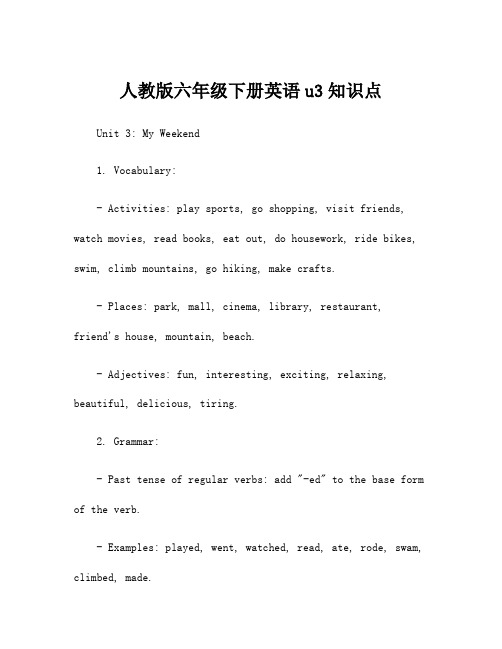
人教版六年级下册英语u3知识点Unit 3: My Weekend1. Vocabulary:- Activities: play sports, go shopping, visit friends, watch movies, read books, eat out, do housework, ride bikes, swim, climb mountains, go hiking, make crafts.- Places: park, mall, cinema, library, restaurant,friend's house, mountain, beach.- Adjectives: fun, interesting, exciting, relaxing, beautiful, delicious, tiring.2. Grammar:- Past tense of regular verbs: add "-ed" to the base form of the verb.- Examples: played, went, watched, read, ate, rode, swam, climbed, made.3. Sentence Structures:- Simple Past Tense: subject + verb in past tense + object.- Examples:- I played basketball in the park.- She went shopping with her family.- They watched a movie at the cinema.- He read a book in the library.- We ate dinner at a restaurant.- Sarah rode her bike in the park.- The children swam in the pool.- We climbed a mountain last weekend.- Emily made a craft at home.4. Dialogue Patterns:- A: What did you do on the weekend?B: I played sports / went shopping / visited friends / watched movies / read books / ate out / did housework / rode bikes / swam / climbed mountains / went hiking / made crafts.5. Sample Conversation:A: What did you do on the weekend?B: I played sports with my friends in the park. It was so much fun!A: That sounds exciting! Did you do anything else?B: Yes, after playing sports, we went shopping at the mall. I bought a new pair of shoes.A: That's cool! Did you watch any movies?B: Yes, in the evening, we watched a movie at the cinema. It was really interesting.A: Wow, you had a busy day! Did you do anything relaxing?B: Yes, on Sunday, I read a book in the library. It was a wonderful story.A: That sounds nice. Did you eat out at a restaurant?B: Yes, on Sunday night, we ate dinner at a restaurant. The food was delicious!A: Great! Did you do any outdoor activities?B: Yes, on Saturday, I rode my bike in the park. The weather was perfect.A: That's fantastic! Did you go swimming or hiking?B: No, but I went swimming in the pool with my sister. It was refreshing.A: That's wonderful! Did you explore any mountains?B: Yes, on Sunday morning, we climbed a mountain. The view from the top was beautiful.A: Amazing! Did you do any arts and crafts?B: Yes, I made a craft at home. It was a lot of fun to create something with my hands.A: Sounds like you had a great weekend!。
人教PEP六年级下册Unit 3 (1)重点知识梳理
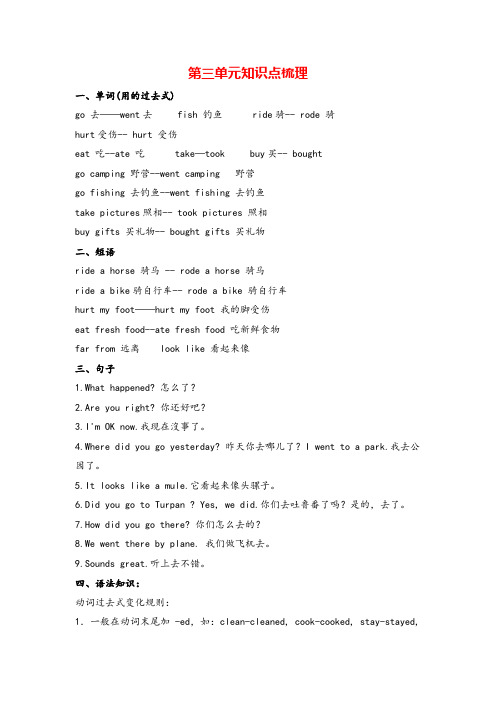
第三单元知识点梳理一、单词(用的过去式)go 去——went去 fish 钓鱼 ride骑-- rode 骑hurt受伤-- hurt 受伤eat 吃--ate 吃 take—took buy买-- boughtgo camping 野营--went camping 野营go fishing 去钓鱼--went fishing 去钓鱼take pictures照相-- took pictures 照相buy gifts 买礼物-- bought gifts 买礼物二、短语ride a horse 骑马 -- rode a horse 骑马ride a bike骑自行车-- rode a bike 骑自行车hurt my foot——hurt my foot 我的脚受伤eat fresh food--ate fresh food 吃新鲜食物far from 远离 look like 看起来像三、句子1.What happened? 怎么了?2.Are you right? 你还好吧?3.I'm OK now.我现在沒事了。
4.Where did you go yesterday? 昨天你去哪儿了?I went to a park.我去公园了。
5.It looks like a mule.它看起来像头骡子。
6.Did you go to Turpan ? Yes, we did.你们去吐鲁番了吗?是的,去了。
7.How did you go there? 你们怎么去的?8.We went there by plane. 我们做飞机去。
9.Sounds great.听上去不错。
四、语法知识:动词过去式变化规则:1.一般在动词末尾加 -ed,如:clean-cleaned, cook-cooked, stay-stayed,2.结尾是e加d,如:live-lived,like-liked3.末尾只有一个元音字母和一个辅音字母的重读闭音节,应双写末尾的辅音字母,再加-ed,如:stop-stopped,4.以“辅音字母+y”结尾的,变y为i,再加-ed如:study-studied cry-cried 5.不规则动词过去式:read--read, hurt--hurt, am/is--was, are--were, do--did, see--saw,sleep--slept, buy--bought, get--got, go--went, have--had, eat--ate,take--took, run--ran, sing--sang, make--made, drik--drank, ride--rode,come--came, give--gave【素材积累】1、人生只有创造才能前进;只有适应才能生存。
人教版六年级英语下册各单元总结指南
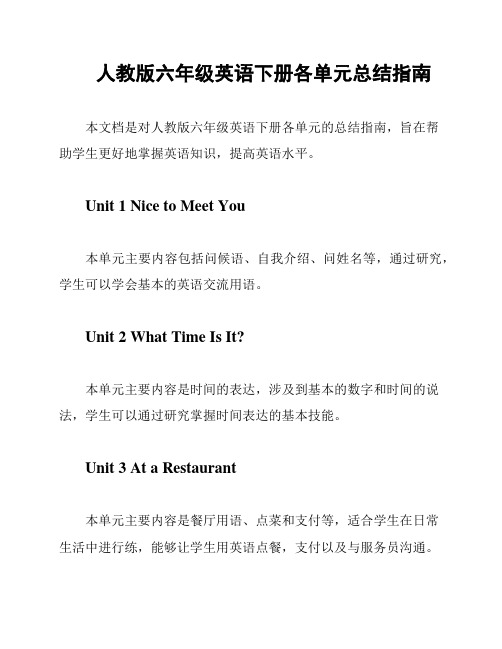
人教版六年级英语下册各单元总结指南本文档是对人教版六年级英语下册各单元的总结指南,旨在帮助学生更好地掌握英语知识,提高英语水平。
Unit 1 Nice to Meet You本单元主要内容包括问候语、自我介绍、问姓名等,通过研究,学生可以学会基本的英语交流用语。
Unit 2 What Time Is It?本单元主要内容是时间的表达,涉及到基本的数字和时间的说法,学生可以通过研究掌握时间表达的基本技能。
Unit 3 At a Restaurant本单元主要内容是餐厅用语、点菜和支付等,适合学生在日常生活中进行练,能够让学生用英语点餐,支付以及与服务员沟通。
Unit 4 My Day本单元主要内容是时间的表达和描述日常活动,通过研究掌握日常活动用语。
Unit 5 Our School本单元主要内容是学校场景用语及学校建筑的描述,学生可以通过研究掌握基本的学校用语。
Unit 6 My Family本单元主要内容是家庭成员的介绍、职业和工作地点等,通过研究掌握家庭成员的英语表达。
Unit 7 At the Zoo本单元主要内容是关于动物的英语表达,学生可以通过研究掌握动物名称的英语表达。
Unit 8 At the Park本单元主要内容是关于公园的英语表达,学生可以通过研究掌握公园场景用语。
Unit 9 Our City本单元主要内容是关于城市的英语表达,学生可以通过研究掌握城市的基本用语以及描述城市的特点。
Unit 10 Happy Holidays本单元主要内容是关于节假日的英语表达,学生可以通过研究掌握节假日的英语表达。
总的来说,本书包含了学生日常生活所需的各个方面的英语表达,希望学生能够在学习英语的过程中更好地掌握英语知识。
人教精通版小学英语六年级下册全册知识点

六年级英语下册知识点整理Unit I went to Sanya for my holidays.【核心词汇】1. 名词sun 太阳moon 月亮star 星星blackboard 黑板subject 学科word 单词;词lesson 课yesterday 昨天2. 动词learn 学习say 说use 用3. 其他but 但是why 为什么4. 短语by plane 乘飞机at night 晚上at home 在家里 a lot of 很多【了解词汇】短语go to the beach 去沙滩enjoy sunbathing 享受日光浴enjoy the moon and stars 看月亮和星星stay at home 待在家里have a party 聚会enjoy Spring Festival 过春节listen to English 听英语speak English 讲英语read English 读英语write English 写英语talk in English 用英语交谈play in English 用英语玩游戏do tasks 做任务have an English party 举办英语聚会act in drama 表演戏剧learn from each other 互相学习【核心句型】1. — What did you do during your holidays? 假期你做了什么?— I went to Sanya with my parents. 我和我的父母一起去了三亚。
解读:这是一般过去时的特殊疑问句。
举一反三: — What did you do yesterday? 昨天你做了什么?— I went to the hospital. 我去医院了。
2. — How did you get there? 你怎样到的那里?— We went there by plane. 我们乘飞机去的。
人教精通英语六年级下3--4知识点梳理
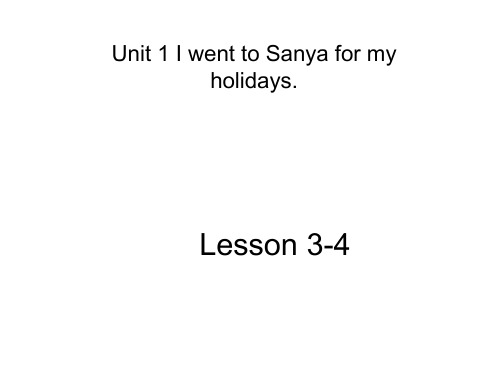
4、three years ago
三年前
5、have learned 已经学会(现在完成时)
6、a lot of 许多、大量 +可数名词复数 +不可数名词
7、use (动词)使用 ;use sth. to do sth. (用… 做…)
例句:I used my mother’s computer to do my homework yesterday. 8、in and out of class 课内外
16、read English 读英语
17、talk in English 用英语交谈
18、play in English 用英语玩
just practise
Homework
Unit 1 I went to Sanya for my holidays.
Lesson 3-4
单
learn
词
学习、学到
a lot of
word
很多
单词、词
blackboard
say
黑板
说
课 文 重 点
1、I‘d like =I would like= want
2、tell (动词)告诉 tell sb. to do sth. tell sb. not to do sth. 3、begin to do sth. 开始做某事 tell sb. about sth.
9、be interested in +名词
+doing
对生活
11、ask(动词) 问、让;
ask sb. to do sth. 让某人做某事
12、do tasks
13、in English
做任务
六年级下册英语三单元知识总结

六年级下册英语三单元知识总结In this unit, we learned vocabulary related to family members and family activities. We understood the importance of family and how they support and love us. Here are some key points:1. Family Members:- Father: The male parent in a family.- Mother: The female parent in a family.- Brother: A male sibling.- Sister: A female sibling.- Grandfather: The father of one's father or mother.- Grandmother: The mother of one's father or mother.2. Family Activities:- Eating Together: Families often gather around the table to share meals.- Playing Together: Enjoying activities like board games, cards, or sports together.- Going Out Together: Going for walks, picnics, or outings as a family.- Helping Each Other: Supporting and assisting family members in daily tasks.3. Family Relationships:- Love and Care: Family members show affection, care, and concern for each other.- Trust: Family members rely on and have confidence in one another.- Support: Providing emotional and practical support during both good and bad times.- Communication: Family members talk and share their thoughts, feelings, and experiences.4. Popular Expressions:- "Blood is thicker than water": Family bonds are stronger than other relationships.- "Like father, like son": Similarities between fathers and sons in terms of behavior or appearance.- "A shoulder to lean on": Someone who provides support and empathy in difficult times.Unit 4: HobbiesIn Unit 4, we explored various hobbies and leisure activities. We learned new vocabulary and expressions related to different hobbies. Here's what we covered:1. Hobbies and Leisure Activities:- Reading: Engaging in books, magazines, or newspapersfor enjoyment.- Drawing: Creating artworks using pencils, pens, or colors.- Dancing: Moving rhythmically to music for pleasure or performance.- Singing: Using the voice to produce musical sounds and melodies.- Playing Musical Instruments: Learning and playing instruments like the piano, guitar, or drums.2. Talking About Hobbies:- I like/love/enjoy + [verb + -ing]: Expressing preferences for specific activities.- My hobby is + [noun]: Describing one's main hobby or interest.- What's your hobby? / Do you have any hobbies?: Asking about someone's hobbies.- How often do you...?: Inquiring about the frequency of engaging in a hobby.3. Discovering New Hobbies:- Trying Different Activities: Exploring new hobbies to find what interests us.- Joining Clubs or Classes: Participating in group activities related to a specific hobby.- Watching Others: Observing and learning from experts or enthusiasts in a particular hobby.4. Sharing Interests:- Talking with Others: Engaging in conversations with friends or family about hobbies.- Showing Achievements: Displaying artworks, musical performances, or other creations.Remember, hobbies are important for relaxation, self-expression, and personal growth. They can also be a great wayto meet new people and make friends who share similar interests.。
人教精通版六下英语第三单元知识点总结.doc
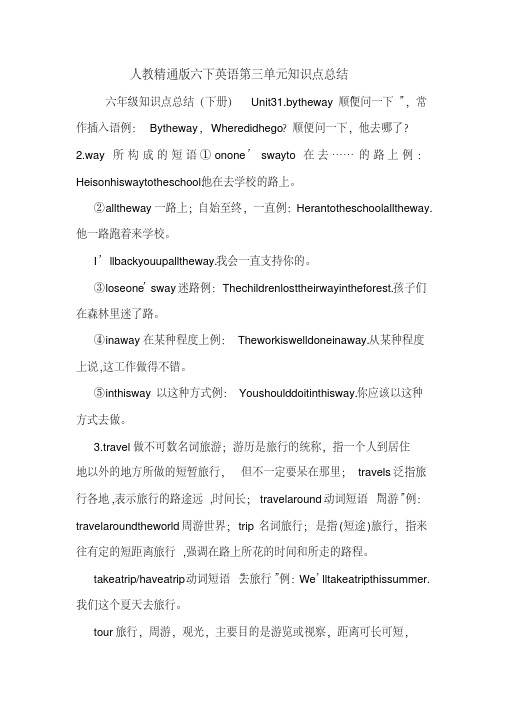
人教精通版六下英语第三单元知识点总结顺便问一下”,常六年级知识点总结(下册)Unit31.bytheway“作插入语例:Bytheway,Wheredidhego?顺便问一下,他去哪了?2.way所构成的短语①onone’swayto在去……的路上例:Heisonhiswaytotheschool.他在去学校的路上。
②alltheway一路上;自始至终,一直例:Herantotheschoolalltheway.他一路跑着来学校。
I’llbackyouupalltheway.我会一直支持你的。
③loseone’sway迷路例:Thechildrenlosttheirwayintheforest.孩子们在森林里迷了路。
④inaway在某种程度上例:Theworkiswelldoneinaway.从某种程度上说,这工作做得不错。
⑤inthisway以这种方式例:Youshoulddoitinthisway.你应该以这种方式去做。
3.travel做不可数名词旅游;游历是旅行的统称,指一个人到居住地以外的地方所做的短暂旅行,但不一定要呆在那里;travels泛指旅行各地,表示旅行的路途远,时间长;travelaround动词短语“周游”例:travelaroundtheworld周游世界;trip名词旅行;是指(短途)旅行,指来往有定的短距离旅行,强调在路上所花的时间和所走的路程。
takeatrip/haveatrip动词短语“去旅行”例:We’lltakeatripthissummer.我们这个夏天去旅行。
tour旅行,周游,观光,主要目的是游览或视察,距离可长可短,常带有“最后回到出发地”的含义。
一般团队游都是tour,导游是tourguide。
例:5-dayTourtoFrance.法国5日游。
4.goonatrip去旅行goon在表示继续做某事时的用法,a)goontodo 是停止前一个动作,接着做另一个动作例:Thefirststorymadeallofuslaughandhedecidetogoontellanotherone.第一个故事使我们都笑了,他决定再继续讲一个。
小学英语人教精通版六年级下册重点归纳

小学英语人教精通版六年级下册重点归纳第一单元Unit1 I went to Sanya for my holidays.重点单词:Sun 太阳moon月亮star星星Learn 学习;学到word 单词;词blackboard黑板say 说subject学科but 但是yesterday昨天why 为什么use用重点短语:1.by plane 乘飞机2.at night 在晚上3.at home 在家里4.a lot of 很多5.go to the beach 去沙滩6.do tasks 做任务7.act in drama 表演戏剧8.stay at home 待在家里9.have a party 聚会10.enjoy Spring Festive 过春节11.listen to music 听音乐12.speak English 讲英语13.read English 读英语14.write E n glish 写英语15.talk in English n用英语交谈16.play in English 用英语玩游戏17.enjoy sunbathing享受日光浴18.have an English party举办英语聚会19.enjoy the moon and stars看月亮和醒醒20.learn from each other 互相学习。
重点句型:1. We have learned a lot of English words我. 们学了很多英语单词。
2. We learned from each other我. 们互相学习。
2.What did you do for your holidays?你假期做了什么?3.I went to Sanya.我去了三亚。
4.We are very interested in English我. 们对英语很感兴趣。
5.How did you learn English?你(们)是怎么学英语的?6.We learned English by doing things我. 们通过做事情来学英语。
六年级下册英语三单元

六年级下册英语第三单元的知识点
1. 词汇和短语:这一单元学生将学习一些与食物、餐厅和
点餐相关的词汇和短语,如菜单、点餐、餐具、食物名称、饮
料等。
2. 语法和句子结构:这一单元学生将学习一般现在时的基
本句型和动词第三人称单数的用法,如He/She eats an apple every day. They play basketball every Saturday.
3. 阅读理解:学生将学习如何阅读和理解菜单和点餐相关
的对话,理解餐厅中点餐的流程和礼仪。
4. 写作:学生将学习如何写一份餐厅点餐的对话,包括看
菜单、点菜、确认菜品和饮料等环节。
5. 听力和口语:学生将通过听力练习和口语活动学习如何
正确地发音和朗读与食物、餐厅和点餐相关的句子。
6. 文化知识:学生将了解一些不同国家的饮食文化和礼仪,如用手抓饭、使用刀叉等。
通过这些知识点的学习,学生将能够更好地理解和掌握英语在日常生活中的应用,提高语言技能和交际能力。
— 1 —。
六年级下册英语三单元知识点
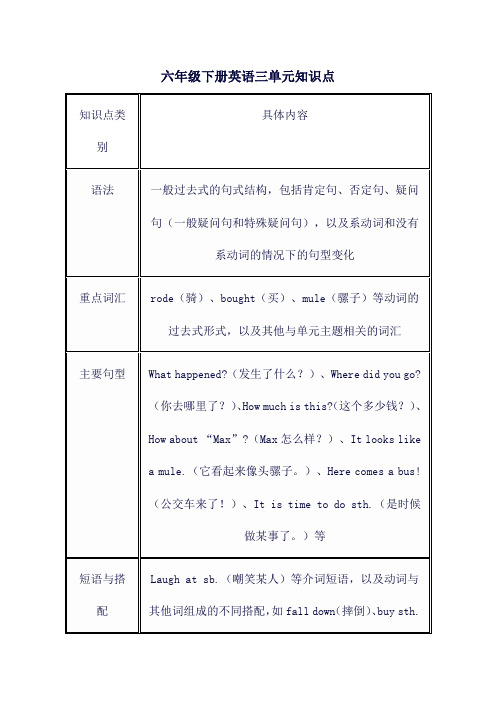
Laugh at sb.(嘲笑某人)等介词短语,以及动词与其他词组成的不同搭配,如fall down(摔倒)、buy sth.for sb.(为某人买某物)等
注意事项
一部分动作单词的过去式是特殊形式,需是went,see的过去式是saw等
六年级下册英语三单元知识点
知识点类别
具体内容
语法
一般过去式的句式结构,包括肯定句、否定句、疑问句(一般疑问句和特殊疑问句),以及系动词和没有系动词的情况下的句型变化
重点词汇
rode(骑)、bought(买)、mule(骡子)等动词的过去式形式,以及其他与单元主题相关的词汇
主要句型
What happened?(发生了什么?)、Where did you go?(你去哪里了?)、How much is this?(这个多少钱?)、How about “Max”?(Max怎么样?)、It looks like a mule.(它看起来像头骡子。)、Here comes a bus!(公交车来了!)、It is time to do sth.(是时候做某事了。)等
- 1、下载文档前请自行甄别文档内容的完整性,平台不提供额外的编辑、内容补充、找答案等附加服务。
- 2、"仅部分预览"的文档,不可在线预览部分如存在完整性等问题,可反馈申请退款(可完整预览的文档不适用该条件!)。
- 3、如文档侵犯您的权益,请联系客服反馈,我们会尽快为您处理(人工客服工作时间:9:00-18:30)。
人教精通版小学英语下册六年级三单元知识点
13——14课
单词:1.travel旅行2.plan计划3.world世界4.place地方5.around 围绕
ke湖泊
7.hear听见
8.visit参观
9.America美国10.tomorrow 明天
11. classmate同学 12.know 知道【同音词no 不】
短语:1.summer holiday 暑假 2.the Great Wall 长城 3.the West wall西湖 4.the longest wall最长的墙 5.by plane 乘飞机 6. winter holiday寒假
7. by ship 乘轮船8. by train乘火车 9.by bike 骑自行车10. by car坐汽车15——16课
单词:1.north北部2.about关于3.history历史4.park公园5.map地图
6.Sunday 周日
7.Monday星期一
8.Tuesday星期二
9.Wednesday星期三
10.Thursday星期四11.Friday星期五12.Saturday星期六13.weekend周末
短语:1.the Great Wall长城 2.the Ming Tombs明十三陵3.Beihai Park 北海公园4.the Summer Palace颐和园5.the Forbidden City 紫禁城
6.the Temple of Heaven天坛
7.be far from远离
8.tour guide导游
17——18课
单词:1.London伦敦2.capital首都3.famous著名的4.Australia澳大利亚
5.Disneyland迪斯尼乐园
6.tower塔
7.Canada加拿大
8.fanstastic极好的
9.want想10.see看见11.place 地方12.favourite最喜欢的13.Britain英国
14.them他们【宾格】 15.bridge桥
短语:1.Tower Bridge 伦敦塔桥 2.Big Ben大本钟3.Niagara Falls尼亚加拉大瀑布 Tower加拿大国家电视塔5.Sydney Opera House悉尼歌剧院
1 / 1。
